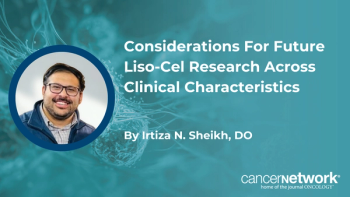
- ONCOLOGY Vol 16 No 3
- Volume 16
- Issue 3
A Phase II Study of Apolizumab, a Humanized Monoclonal Antibody, in Patients With Relapsed or Refractory Follicular, Small Lymphocytic, or Marginal Zone/MALT B-Cell Lymphoma
The humanized monoclonal antibody apolizumab (Remitogen, Hu1D10), directed against a polymorphic determinant of HLA-DR expressed on normal and malignant B cells, is capable of inducing antibody-dependent cellular cytotoxicity, complement-mediated lysis, and direct apoptosis of lymphoma cell lines (Int J Cancer 93:556-565, 2001).
The humanized monoclonal antibody apolizumab (Remitogen, Hu1D10), directed against a polymorphic determinant of HLA-DR expressed on normal and malignant B cells, is capable of inducing antibody-dependent cellular cytotoxicity, complement-mediated lysis, and direct apoptosis of lymphoma cell lines (Int J Cancer 93:556-565, 2001).
Results of a phase I dose escalation trial in 20 B-cell lymphoma patients reported four of eight patients with follicular lymphoma treated with weekly infusions achieving durable responses (partial responses or unconfirmed complete responses [Proc Am Soc Clin Oncol 20:284a, 2001]). The median time to response was 106 days, with continued remission more than 400 days following antibody treatment. For this reason a phase II, multicenter, open-label, randomized study in patients with relapsed or refractory follicular, small lymphocytic, or marginal zone/mucosa-associated lymphoid tissue (MALT) B-cell lymphoma was initiated to further determine safety and efficacy in this population at two dose levels of apolizumab.
Patients are randomized to receive apolizumab infusions at 0.5 mg/kg or 1.5 mg/kg, once weekly for 4 consecutive weeks. Tumor response is evaluated at weeks 4 and 12 following the last apolizumab infusion, every 3 months thereafter for the first year and every 6 months for the second year or until disease progression occurs. A total of 60 patients will be enrolled. To date, 31 of 51 patients screened were found to have tumors that express the 1D10 antigen; 21 of these patients have been treated with apolizumab to date.
The median patient age is 64 years (range: 53-79 years), including 13 males and 18 females; median number of prior treatments is 3 (range: 1-6). Currently enrolled patients have the following histologies: follicular small cell (n = 5), follicular mixed cell (n = 9), follicular large cell (n = 1), small lymphocytic (n = 5), and marginal zone (n = 1) lymphoma.
Treatment has been generally well tolerated. To date, all patients have received all scheduled infusions without treatment delay. Adverse events, (primarily infusion-related grade 1/2) include urticaria, pruritis, angioedema, fever, chills, hypotension, dyspnea, nausea, headache, and fatigue. One patient experienced a grade 3 infusion syndrome during the first dose consisting of hypotension, hypoxia, and dyspnea, and required overnight hospitalization. Symptoms reversed with supportive care and this patient went on to receive all four infusions. Another patient had 24 to 48 hours of facial and peripheral angioedema, urticaria, and pruritus after each infusion, resistant to antihistamines. Infections observed to date include one episode of oral candidiasis and two episodes of herpes zoster.
CONCLUSION: Response data will be available with further follow-up.
Articles in this issue
almost 24 years ago
Single-Agent Rituximab in Early-Stage Chronic Lymphocytic Leukemiaalmost 24 years ago
Recruitment for Trial of Adjuvant Trastuzumab Under Wayalmost 24 years ago
Rituximab in the Treatment of Acquired Factor VIII Inhibitorsalmost 24 years ago
Support for New Medicare Pay Formulaalmost 24 years ago
Irinotecan-Containing Regimen Improves Survival in Small-Cell Lung CancerNewsletter
Stay up to date on recent advances in the multidisciplinary approach to cancer.










































